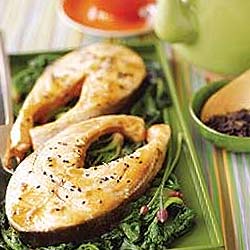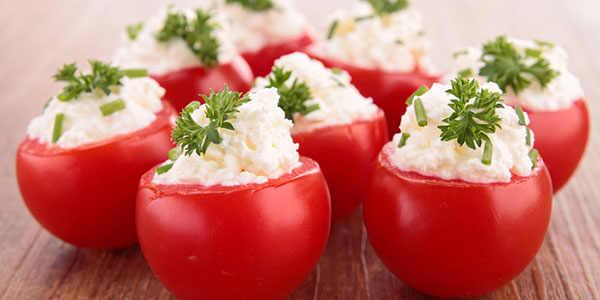Gluten-free Diet
What is gluten?
Gluten is a protein found in wheat, rye, barley and triticale. Most people can eat gluten without any problems, but people who have celiac disease (also called celiac sprue) should not eat gluten.
What does gluten do to people who have celiac disease?
Gluten damages the intestines of people who have celiac disease. This damage keeps the body from taking in many of the important nutrients in food. These include vitamins, calcium, protein, carbohydrates, fats and other important nutrients. The body can't work well without these nutrients. Even small amounts of gluten in foods can hurt people who have celiac disease.
Avoiding gluten does not have any known health benefits for people who do not have celiac disease.
Why is a gluten-free diet important?
Celiac disease is serious. You can control celiac disease just by not eating any gluten. But it may take some time for you to learn how to cut gluten from your diet. Your doctor may suggest that you get help from a registered dietitian. By following the right diet, you can reverse the damage caused by celiac disease and you'll feel better. If you “cheat” on your diet, the damage will come back, even if you don't feel sick right away.
What foods contain gluten?
Gluten is found in wheat, rye, barley and triticale grains. This includes things made from these grains, like bran, bulgur, couscous, einkorn, durum, faro, farina, graham flour, matzo flour, kamut, semolina and spelt. These grains are found in a variety of foods, including cakes, breads, pasta and cereals.
These grains are also often added to processed foods, so it’s important to carefully read the food labels to check for sources of gluten. Manufacturers often change the ingredients in processed foods, so you need to be sure to check each food every time you buy it.
As you learn to spot gluten on food labels, be sure to remember that wheat-free does not mean gluten-free. If you’re not sure whether a food has any gluten, it’s best not to eat it.
Sometimes gluten is added to unlikely foods and products. Some of these include:
- Beer and other alcohol
- Croutons, breading and stuffing
- Processed deli meat
- Imitation bacon and seafood
- Sauces, gravies and thickeners
- Soup and soup bases
- Soy sauce
- Communion wafers
- Marinades
- Malt, malt flavoring and malt vinegar
- Prescription and over-the-counter medicines and supplements
- Dietary supplements, including vitamins
- Lipstick, lip gloss and lip balms
- Play dough (children who have celiac disease should wash their hands after using play dough)
What foods can I eat on a gluten-free diet?
Being on a gluten-free diet doesn’t mean you can’t enjoy a healthy, well-balanced diet that includes a wide variety of foods. There are many foods that are naturally gluten free, including:
- Fruits
- Vegetables
- Meat, fish and poultry (without marinade or coating)
- Rice
- Nuts
- Gluten-free flours (potato, soy, rice, millet, flax, sorghum, tapioca and corn flours)
- Many dairy products, including milk, cottage cheese, cream cheese and most yogurt
There are also a wide variety of gluten-free foods available as substitutes for foods that normally contain gluten. Some of these options include gluten-free breads, pastas, sauces and baked goods. You can find many of these gluten-free foods at your local grocery store in the health food or gluten-free section. You can also find them at specialty grocery stores or on the Internet.
How do I get started?
Finding out that you need to eat a gluten-free diet can seem overwhelming. Your doctor can help get you started by providing you with comprehensive lists of foods you can have and foods you need to avoid. A dietitian can help you develop a gluten-free nutritional plan that will include all the nutrients that you need in your daily diet.
Tips for Coping:
- Learn as much as you can about gluten-free diets. There are plenty of books, cookbooks and websites about how to eat a gluten-free diet.
- Ask questions when you’re eating out. Ask your waiter or the chef about what ingredients are used in the menu items. Sometimes a gluten-free menu is available. Some cities also have restaurants that specialize in gluten-free diets.
- Join a support group. Talk to your doctor about finding a support group for people who have celiac disease. Talking to other people who are in the same situation as you can be helpful.
Do I need to add a dietary supplement to my gluten-free diet?
You can usually get all the vitamins and minerals you need by eating a gluten-free diet that includes a variety of healthy foods, such as fruits, vegetables, whole grains, lean meats and fish. However, if you are just starting a gluten-free diet, your doctor may want you to take a supplement. This is because it may have been difficult for your body to absorb all the vitamins and minerals it needed when you were still eating foods containing gluten. If you take a supplement, be sure to choose one that is gluten free. Your doctor can help you find the supplement that is right for you.
Other Organizations
-
Best Exercises to Lose Stomach Fat at Home
Many people try to lose their belly fat and dream about a flat one
-
Rapid weight loss diets. Do they work?
Weight loss has become one of the biggest businesses these days
-
Homemade Syrup That Burns Belly Fat – The Results Are Astonishing!
This syrup will certainly help you in eliminating fats and extra w
-
How Carbs Make You Thin... for Life
Research behind The CarbLovers Di
-
Detox Drinks to Lose Weight
Nowadays, we consume so much processed and junk food, that our bodies
-
15 Foods with Almost No Calories and a Ton of Nutrients
If you want to lose weight and keep it off, the only way to succes
- DON'T MISS
- Coffee The Weight Loss Product Is On Offer!
- The ultimate list of fat burning foods
- Healthy Vegetarian Diet – fruits and vegetables
- Eating little & often does NOT boost metabolism
- Vacuum in The Belly – Get a Thinner Waist and Flat Stomach With This Simple Exercise
- Choosing the Right Diet to Lose Weight
- Top 5 Zero-Calorie Fat-Burning Foods to Add to Your Diet Immediately
- Vegetarian Diet
- The Fertility Diet: What To Know
- What is the Best Way to Lose Weight? Diet Food Delivery and More...




